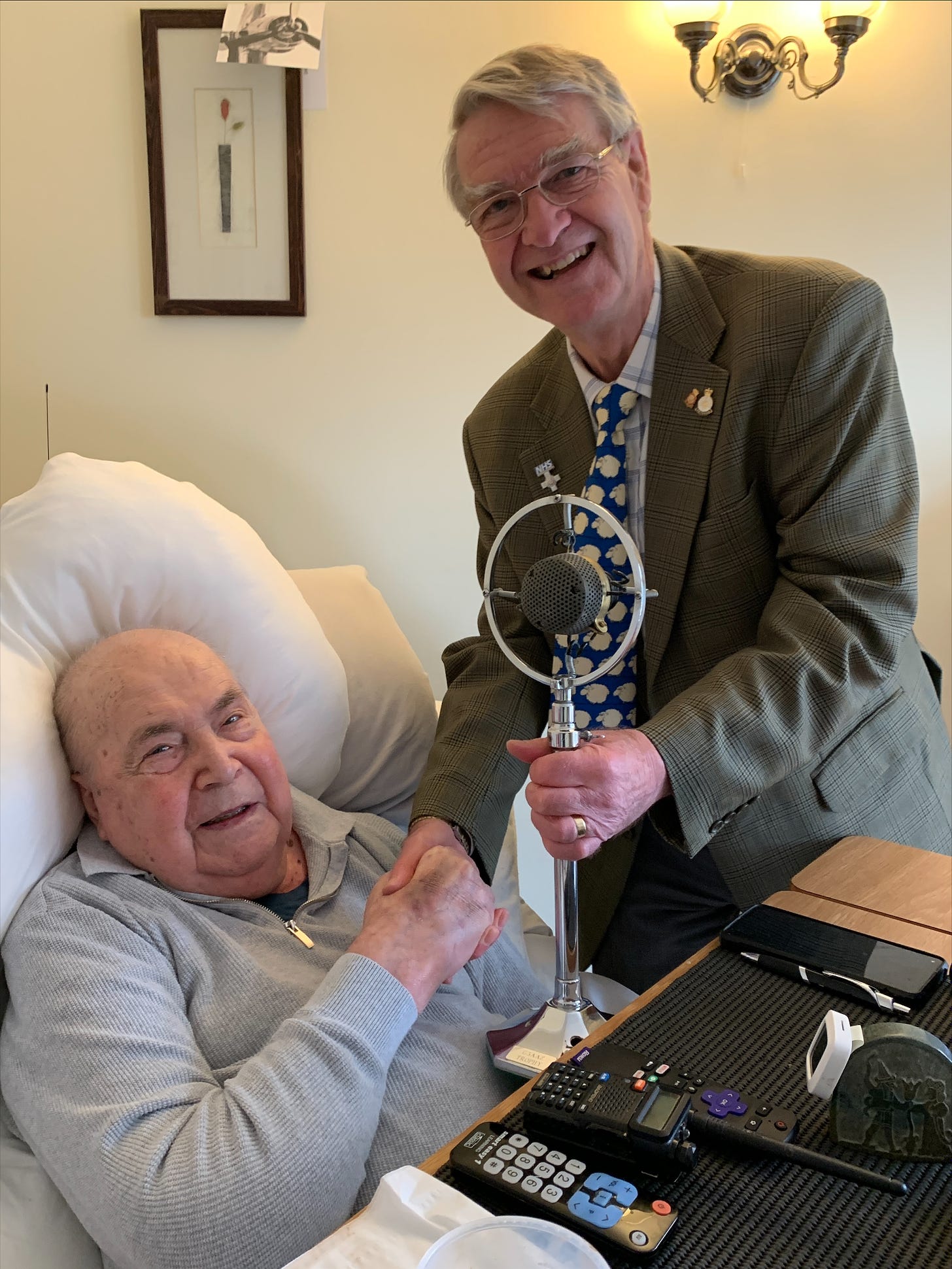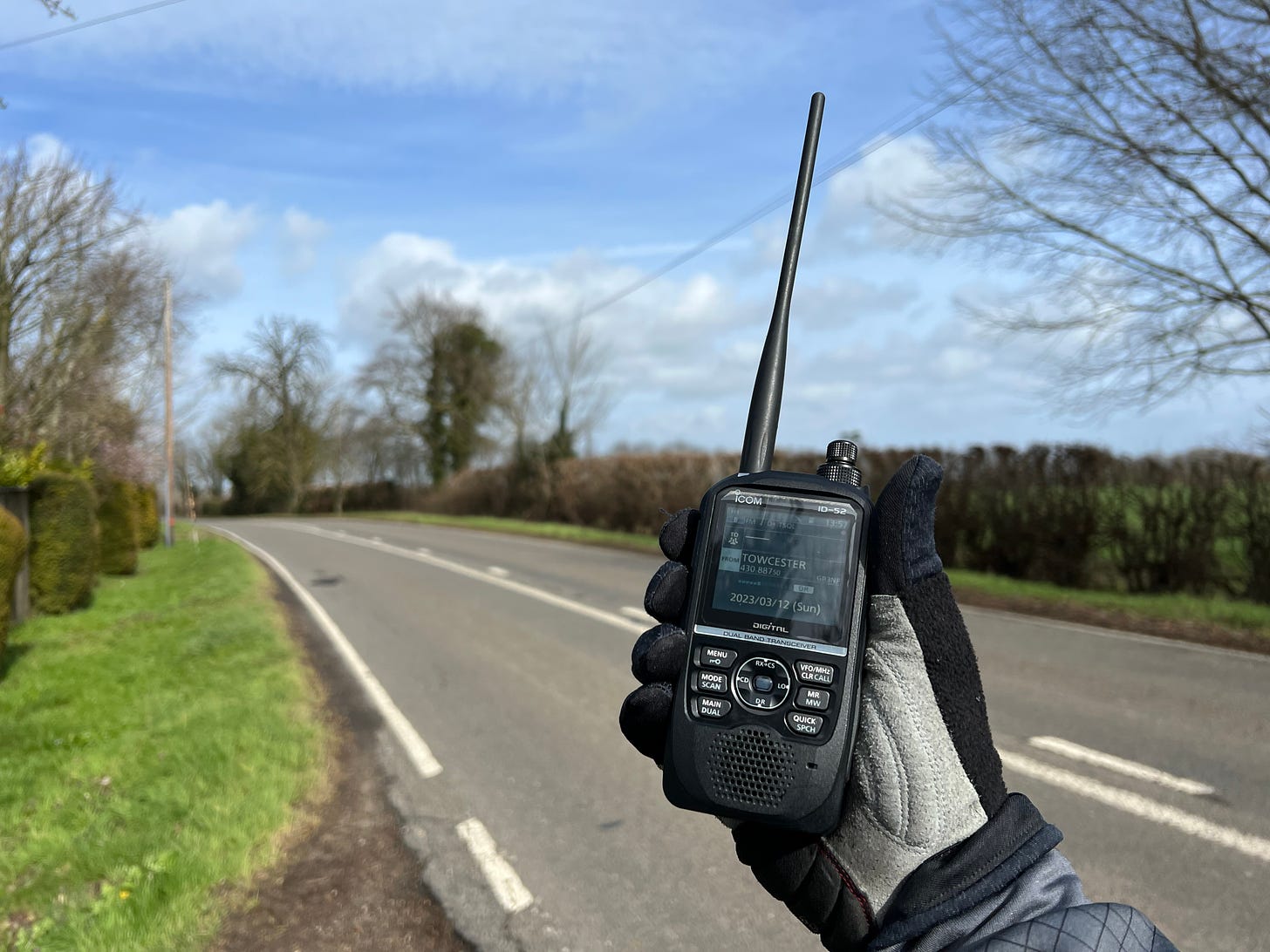
End of an era for radio round my way.
While listening to the morning net on GB3OV G7DIU announced “This is my last transmission”.
This hit everyone listening like a bolt from the blue. David is as respected as they come in these parts. A long history of supporting the club, individuals and radio in general, he has made an impact on so many people.
He is suffering with a condition that makes it extremely difficult to key a mic and the last couple of overs were made with the assistance of his wife and carer, Hilda.
It’s unusual to hear such an out pouring of respect for an amateur over the air while they are still alive. He will be greatly missed for being a corner stone of local radio for as long as anyone round here can remember. In fact a large number of people including me cite David as their first contact via the repeater.
He was net controller for years and his Net on OV was my first experience of a Amateur Radio nets.
When someone asked me what my interest was in radio, outside of HF I’d state it was getting to chat with people like David.
Interested and interesting he was younger than his years. I heard him as a curious, excited big kid keen to know what others were doing and thinking. Always inclusive and diplomatic, at the same time as being playful and occasionally cheeky.
He had a gift to be able to not only extract the stories but always had something fascinating to add to them.
It’s all about human connection and David knows that. Radio is personal, social, intimate. And he does/did it so well.
I had only just arrived in this weird and wonderful space when I met David and he really inspired me. In fact I’d go as far to say that it’s David that kept me interested. From M7XTN to 2E0AKA and finally as G5DOC. He was the first to congratulate anyone on their successes and find the lessons in any failures.
I hope like David did, I can still be in awe of the magic of it all for many years to come.
When he was suddenly taken ill two years ago and left the air for a while, I told him all this. Thanking him for the many years he gave to radio and the community. I told him that I felt lucky to have been involved in a small part of it. And I still do. Many people do.
Then when he returned home from the hospital and the club helped him get back on air it felt a little like a miracle. Thanks to G4UXV taking the reins as net controller, David got almost two bonus years on the net.
The award you see in the above photo is the G3AAZ Trophy being delivered by the current HARS president M0VTG. Given in recognition of David’s support for the society and amateur radio in general. The smile and the eyes of G7DIU say it all.
It might be that we can come together again to make it easier for David to communicate with minimal effort. If there are no mechanical aids to do this I have offered to help key the mic for him for at least one day a week. If he is up for this, i’m sure others would do the same. But I feel his decision on this may be final. And this is his prerogative.
While David feels unable to participate in radio, I hope he can still listen to the continued outpouring of love and respect for him that his fellow community continue to share.
Either way, thank you David for being a patient, understanding and knowledgeable mentor to me, and a friend for so many.
After hearing David’s last transmission I headed out ‘cycling mobile’ and popped onto GB3NP for a quick chat with M3BWW and M7ICK I shared with them the very poignant moment many of us had just experienced. They understood in the way only other radio operators can, and I cycled on wondering how many David’s there were on all the thousands of repeaters around the world. I know there will be lots of Daves. We have at least five on OV. But how many David’s are like our Dave G7DIU?
Everything you ever wanted to know about jamming, the worlds, secret intelligence number stations.
Today’s lesson is understanding the benefits of radio bandwidth.
As if this email is not wordy enough here are lots more.
My thoughts on diversity in Amateur Radio.
As a kid on the CB in the mid to late 80’s, I lived on channel 14. Sometimes 19 if 14 was quiet. Living in the Midlands, there was always a fascinating mix of people. I met a girlfriend on 27 meg and at one point in the town of Rugby, ‘eyeballs’ with people from channel 14 seemed to be an equal split between male and female.
The popularity of CB popularity started to decline in the 1990s with the widespread adoption of mobile phones. While hobbyists and off-road enthusiasts hung on to CB, it might be that some tech-savvy CB operators took the plunge as well as an exam to get into Amateur radio. Perhaps looking for a wider range of frequencies and modes of communication.
Looking through the lens of now, I feel there is a lot to be discussed about diversity in UK amateur radio. Of course when we only hear a voice it’s easy to make assumptions and our natural bias makes it easy for us to stereotype. So my opinion on this mostly comes from attending clubs and rallies and noticing just how male and white everything is.
According to the 2021 census there are 16 ethnic groups in England and Wales and although I’m not be best placed to comment on this, I would like to see how I can help to make this amazing hobby more welcoming to all.
I have considered the lack of diversity in amateur radio for a while but struggle to find the answers. I figure that if I’m not a part of the problem then i’m certainly a part of the not so silent majority. So I’d at least like to speculate on how we can make this hobby welcome to all.
It’s certainly not a case of ‘if you use it they will come’ and I know I’m sticking my neck out here, but I don’t want this to just be about casual racism, sexism or any other ism which if you haven’t experienced/heard online you might only hang around on FT8. It is certainly out there.
I’m not generalising though, as while some individuals may struggle to overcome past cultural norms or ingrained biases and beliefs, many others actively work to challenge their own prejudices and assumptions.
So I’d like to flesh out my thoughts and contemplate how we got here, I’d like to come up with a game plan. Something that might assist us in reaching out to everyone who might enjoy this amazing hobby.
Let us take a look at a few of the factors that I think contribute to the lack of diversity in UK amateur radio.
Historical legacy: With the long and amazing history of amateur radios dating back over a century, it’s been predominantly practiced by white males. This legacy has shaped the culture and practices of amateur radio and as a result may not be welcoming or inclusive to those from diverse backgrounds.
Cost: Building and maintaining a radio station is not cheep. Thankfully clubs often help out with the loan of equipment while people save. But the cost of the kit can also be a barrier for those from lower income backgrounds.
Technical barriers: Amateur radio requires a certain level of technical proficiency and access to equipment, which can be a barrier for those who may not have had the same educational opportunities or access to resources.
Lack of representation: When people don't see themselves represented in a particular activity or community, they may not be as interested in participating. Although this is slowly changing, Amateur radio is mostly represented in the media as an activity for older white males. Which is great for attracting more older white males but possibly discourages people from diverse backgrounds from getting involved.
Cultural factors: Rotate the HF dial and you will hear operators the world over. But some cultures may not have a strong a tradition of amateur radio or it could even be restricted or illegal in that part of the world. This can also limit diversity.
With a little mindfulness and effort we can address these factors and make amateur radio more welcoming and accessible to people from diverse backgrounds.
Why? Because I feel the future of Amateur radio depends on it.
When people from diverse backgrounds come together, they bring different perspectives and experiences. This might then lead to new ideas and innovative solutions to problems. Or even new modes. We are more likely to keep hold of the bands if we can keep this hobby evolving.
Also more diversity will help break down stereotypes and assist in the building of cross cultural empathy and understanding.
How can we do this?
Ideally clubs will enhance their outreach, education and mentorship initiatives. This can create a more welcoming and inclusive environment open to people of all cultures and sexes.
This could work with reaching out with amateur radio open days and informational sessions. Not just in the local press but with local community organisations like religious and cultural centres as well as women's groups.
I met my club at a village festival so I know they have already been down this path. I know my clubs is keen to expand membership and I hope to discuss how we might experiment in new places.
Perhaps your club might also consider this a priority. If so, feel free to share this post with someone who might be able to facilitate some positive change.
It might be that you are in a club that has already embraced inclusivity and acceptance of all individuals and cultures. If so please leave a comment and let me know how it went.
FINALS
Thanks for reading and I hope subscribing.
Please share this wherever you think it might resonate. At time of writing there are 222 subscribers to this email.
All the spelling mistakes are just there to check you are paying attention. Feel free to comment, like and share elsewhere. You can assist me in purchasing new gear to review by sending large (or small) amounts of cash to my PayPal account.
I’m on the look out for a power amp I can use with my iCom IC705 into. Let me know if you have one in the shack you’re not using. ;-)
You are some of the more curious people in radio… And I thank you.
Have a great weekend.
Over
73 de Christian G5DOC







